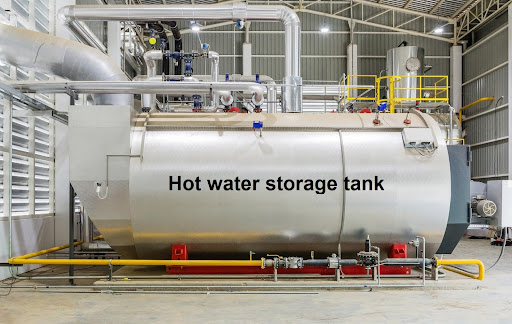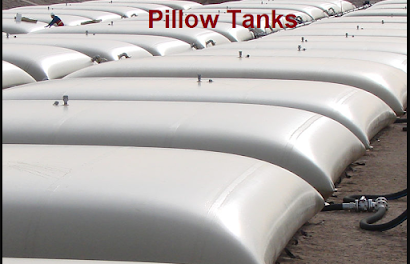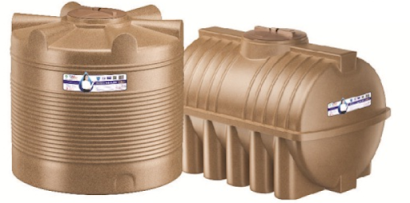INDUSTRIAL HOT WATER STORAGE TANKS
·
Industrial
hot water storage tanks are ASME certified built to be used in industrial
applications in which a constant hot water supply is required.
·
During low
demand periods, water is heated and stored inside the water storage tank, which
will be available to be used in times of high hot water demand.
·
This enables
efficient energy use while offering hot eater whenever required.
·
Water makes
a good medium of heat storage due to its high specific heat capacity.
·
Water can store
greater heat per unit weight in comparison with other substances. Moreover,
water is low cost and non-toxic.
·
An
industrial hot water storage tank that’s insulated efficiently has the ability
to retain the stored heat for many days, thus reducing the fuel costs.
·
These
storage tanks in industries may consist of an inbuilt oil or gas burner system,
and electric immersion heaters.
·
Hot water
tanks of certain types utilize external heat exchanger, like a central heating
system.
·
Alternatively,
these tanks types may use heated water from a different energy source.
INSULATION OF HOT WATER STORAGE TANKS
·
Hot water
storage tanks typically have heat insulation for lowering energy consumption,
quickening the heating process as well as maintaining desired operating temperature.
·
Standby heat
loss is reduced by thicker thermal insulation.
·
Water
heaters come in varied insulation ratings; however, extra layers of insulation
can be added outside the water heater for reducing heat loss.
·
In case of
extreme conditions, a water heater may be fully enclosed within an insulated
space that’s specially constructed.
·
Fiberglass
makes the most common type of insulation for water heaters.
·
It’s fixed
in place using straps or tape or with the water heater’s outer jacket.
·
In cases
where burner is used, the combustion gas outflow or air flow should not be
blocked by insulation.
·
Most of the
modern water heaters comprise insulation of applied polyurethane foam (PUF).
·
In cases
where it’s crucial to access the inner tank (where particularly aggressive
oxygen levels or minerals are present in local water supply), PUF insulation is
used in an encapsulated form.
·
This allows
the insulation layer to be removed to conduct regular integrity checks as well
as repairs to the tank (if needed).
SAFETY CONCERNS
·
Hot water
can lead to dangerous and painful scalding injuries, in the elderly and
children especially.
·
Water
temperature at the outlet must not be greater than 49 degrees Celsius.
·
Whereas,
water stored below the temperature of 60 degrees Celsius may allow bacteria
growth (the bacteria causing Legionnaire’s disease).
INDUSTRIAL
WATER AND LIQUID STORAGE TANKS
·
Water and
liquid storage tanks are used to store a variety of liquids like kerosene, jet
A, diesel, gasoline, waste oil, and for underground burial and pressurized
applications.
·
Liquid
storage tanks come in different types, each type having its own specific
applications.
Types of Water and Liquid Storage Tanks
Onion Tanks
·
Onion tanks
are a great option to store water quickly during emergency events.
·
These tanks
are self-rising having fittings that are easy to access.
·
Moreover,
these tanks can be moved as well as set up within minutes.
Pillow (Bladder) Tanks
·
Collapsible tanks – referred to as
blivet, bladder, or pillow tanks also – are an effective re-usable temporary
storage solution.
Poly Tanks
·
Poly tanks have domestic uses too.
·
They are
used for various applications including rainwater collection and drinking water
storage.
·
Poly tanks
are available in different types that include wastewater tanks, mobile tanks,
above ground tanks, and more.
Fiberglass Tanks
·
Fiberglass
liquid storage tanks are durable as well as they don’t corrode or rust easily.
·
These tanks
have a high level of temperature resistance.
·
They come
with different coatings so as to offer optimum performance with various liquid
storage needs.
Welded Steel Tanks
·
Welded steel
tanks make a reliable solution for storage over long term.
· They come in various shapes and sizes to fit different types of applications.
Corrugated Steel Tanks
·
Corrugated
steel liquid storage tanks are versatile, durable, economical, and have a good
longevity.
·
They are
made using galvanized corrugated steel.
·
These tanks
are available in various sizes as well as can be customized for meeting
specific project needs.
·
Corrugated
steel tanks are used for rainwater collection, industrial process water, or
fire suppression.
Industrial
Plastic Storage Tanks
·
Water
storage is important for domestic, residential, industrial, and commercial
purposes.
·
Plastic
water storage tanks are one among the best ways for water storage
conventionally.
·
Plastic
tanks are light-weight, highly durable, and occupy less area compared to cement
and concrete tanks.
·
Moreover,
plastic tanks have greater flexibility compared to conventional storage tanks.
·
Such
advantages of plastic water tanks have made them a popular option.
MATERIALS USED TO MAKE PLASTIC WATER
STORAGE TANKS
·
Plastic water tanks are made with
different materials like linear low density polyethylene, fiber glass materials
or polypropylene.
Applications of Plastic Water Storage
Tanks
·
Plastic
water storage tanks are seeing increased applications in food processing,
wastewater containers, chemical manufacturing, suppression valves, and
agriculture and irrigation.
·
Plastic
tanks are built on the basis of the liquid type to be stored.
·
The storage
capacity of these tanks lay between 1.5 and 1.9 specific gravity.
·
Plastic used
in a storage tank usually allows the liquid level to be visible easily.
·
Plastic
storage tanks are employed widely to store liquids that include brine, waste
vegetable oil, soaps, cleaning agents, industrial chemicals, agriculture and
farm chemicals, diesel exhaust fluid (DEF), liquid fertilizers, potable water,
and non-potable water.




Comments
Post a Comment